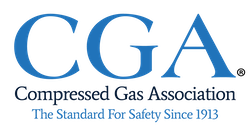
Hydrogen Takeaways
December 2022
Last fall, CGA’s Board of Directors approved a significant work effort to provide safety resources for the growing hydrogen fuel economy. This program includes the expansion of CGA’s hydrogen standards library, a comprehensive communications and public relations campaign, and direct outreach to external organizations and stakeholders in the hydrogen space.
Throughout the course of the year, CGA staff presented at ten hydrogen conferences, sharing our Safety is Step One message with more than 32,000 conference attendees. Many of these events connected us with audiences well outside of our membership – from fueling station operators, to utility companies, to aviation and aerospace companies. Our message included three core concepts:
- an introduction to CGA and our long history of hydrogen standards development;
- specific examples of how standards can pave the way for adoption of emerging technologies; and
- an overview of the hydrogen standards and additional safety resources that CGA has to offer.
These conferences were a substantial success for CGA and gave us an opportunity to take the pulse of the hydrogen space. While we have significant interaction with hydrogen producers, end users bring new perspectives to the table and have different concerns to address. Getting to know this segment of the hydrogen economy helped us to determine how CGA can best be a useful resource to those working in the hydrogen space.
4 Key Learnings from CGA’s Hydrogen Outreach
(1) We must continue to drive the safety conversation forward. The expansion of the hydrogen economy is an exciting growth opportunity and everyone wants to talk about new developments, innovative ideas, and emerging technologies. Many are so focused on mapping out the future that a critical topic is left out of the conversation – safety.
CGA brings safety to the forefront. Our message is clear: a focus on safety is necessary to facilitate public acceptance of hydrogen as a fuel. It is the only way to grow this sector, as one incident will set development back for years. It is a critical element to success. Many conferences recognize the need for practical technical and safety content, and CGA is trusted to bring that content to the table.
(2)There is a tremendous demand for hydrogen knowledge. Hydrogen professionals at all levels are looking for a credible technical authority to guide their next steps. Veteran members of the hydrogen space are looking for new hydrogen standards to support emerging applications. New hydrogen operators are in search of easily understood safety content to educate themselves.
What can CGA do to fill these gaps? Our members have extensive experience with industrial hydrogen production, transportation, storage, and use. They’ve fueled the space race and the growing hydrogen economy for more than 65 years. The lessons learned from these experiences can be applied to hydrogen fueling and other near-consumer uses – and they are already captured in our hydrogen standards library.
(3) We must leverage collective strengths to make progress. This fast-growing sector has many needs: technical and safety information, user training and education, advocacy for effective regulations, just to name a few. There are many urgent needs to be addressed, and there is a pressing need for organizations in this space to work together rather than individually trying to move the ball forward.
CGA has formed several key relationships in the hydrogen space, and we’re taking a leadership role in bringing these organizations together to make coordinated progress in numerous areas. The work that our partners do is going to have a significant impact on our own success. CGA is proud to work with our partners to share our safety resources and support their work efforts.
(4) New entrants bring new perspectives. CGA must continue reaching out to new entrants to the hydrogen space along with the veteran members because some may not realize what they need to learn more about hydrogen safety. For example, blending of hydrogen and natural gas is a topic getting a lot of interest. CGA must become engaged in these efforts to ensure that our learnings help guide the projects in a safe manner that provides results without subjecting the general public to real or perceived dangers.
It’s also important that we invite users to participate in CGA committees. While we have access to a significant technical knowledge base, hearing the questions that users have and the challenges that they are experiencing adds value to our standards development work. We want to work with the greater hydrogen community to ensure that there is buy in at all levels.

